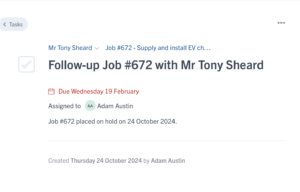The chances are, most of your customers will pay you within a reasonable amount of time. But at some point in your trade career, you will almost inevitably encounter a customer that will either put off paying time after time or simply refuse to pay at all. When this happens, you need to know how to react, what your options are and, perhaps most importantly, what not to do.
Why the customer is not always right
Most tradespeople work on their reputation, so dealing with non-paying or late-paying customers can be really tricky. But by sticking to your guns and following the advice below, you should be able to collect the money owed to you.
There are myriad reasons why customers can’t or won’t pay, and you need to be clear what these are before taking any steps. As always, prevention is better than cure but there are options open to you in almost every situation.
Rogue customers: The problem explained
Imagine the situation, you’ve spent days or weeks working on a project, purchasing materials and carrying out agreed work. When the job’s done you send an invoice only to be treated to stony silence.
You follow up and still nothing. The customer won’t return your calls and never seems to be in. Then, when you do finally get hold of them, it’s excuse after excuse, or worse, an outright refusal to pay.
This kind of scenario plays out time and again all over the UK, and it’s one that most tradespeople will experience more than once in their career. Back in 2008, builder Nigel Gray built a conservatory and porch for his client.
After numerous bounced cheques and excuses, Gray finally decided to take action. After approaching Ardur Council, the owners of the property to get the go ahead, Gray and his colleagues dismantled their work, brick by brick. The images were splashed all over the newspaper and Gray became notorious. But what else was he supposed to do?
For Gray it was a matter of principle but for others, non-payment can be a case of destroying the whole business. Going to court and following up non-paying customers can be prohibitively expensive, not to mention time consuming. It’s simply not seen as an option for many.
Unfortunately, going to court is a last resort for some but here’s what you can do to prevent the situation reaching that conclusion.
Get it in writing
Creating a contract for every job you do can be time consuming but in the long term it could save you countless hours of stress, not to mention thousands of pounds. Agreeing with the customer beforehand what is to be done, for when and how much it will cost in a legally binding document is one sure-fire way of ensuring payment and fewer problems on jobs.
Of course, we realise that you’re not a lawyer and would rather get on with what you do best. But there are contract templates available that do most of the hard work for you.
The Federation of Master Builders is a trade organisation set up in 1941 to protect the interests of small and medium-sized building firms. Become a member and they can offer advice and provide access to contract templates you can use for building work.
Do your homework: Initial credit checks
When customers choose builders, they often do their research. They ask around for references or use online sites like checkatrade.com to ensure they are reliable and aren’t cowboys. Most decent tradesmen understand the importance of reputation and references, and recommend customers always use reputable tradespeople. But why should this only be a one way process?
If you’re entering into a business relationships with someone, you have every right to know a little bit about their background. You are as entitled to know if they are in a position to pay as they are to know you’ll do what’s agreed.
There are numerous online credit check companies such as experian.co.uk that let you check customer’s credit ratings, so you can be sure they are in a position to pay.
Be consistent
You need to make sure that you’re consistent in everything you do. This could prove to be extremely important further on in the process if things are not resolved. It’s vital that you invoice when you say you would, and that invoices are clear and payment breakdowns are thorough. Never give the customer an excuse not to pay.
Leave it too long to invoice and the psychological damage can be done. Invoice when the details are fresh and there is less room for wriggling out of payment. If a customer doesn’t pay you initially, for which there are many legitimate reasons, follow up regularly and in person. Do this within a set time period, say ten to 15 days. Most of the time the matter will be settled at this stage. But keep accurate records of when you send invoices and try to get confirmation of receipt at every opportunity. If necessary, keep a contact log and record all dates, phone calls and other important information, especially if you get a sense the situation may escalate.
It’s often a good idea to have a colleague or third party contact the customer, acting as an accounts manager, to maintain a professional distance. Offer the customer alternative payment options, such as instalments, and try to get an agreement in place for payment.
You can also try contacting the National Mediation Helpline, which is an alternative dispute resolution service (ADR). This is the place you can resolve payment matters before they go to court.
What not to do: Illegal tactics
Non-payment can be incredibly frustrating but it’s important you don’t overstep the mark. This could severely hinder your chances of payment at a later date. There are laws in place to protect you, including the Supply of Goods & Services Act 1982, but once you step outside the law this is more difficult to use in your favour.
You are of course entitled to chase up customers for payment but never stray into harassment. Call at reasonable hours, at regular intervals (not one after another) and don’t make unsustainable claims about what might happen if they don’t pay. Maintain calm and don’t resort to threats or use of third party bailiffs.
It’s also important not to take to Twitter or other social media sites to publicly shame customers or insist they are a credit risk, as things like this can land you in legal hot water. The last thing you need is a defamation suit hanging over you.
Remember that your customer may well be keeping a record of interactions or contact log too (some customers will go to extreme lengths to avoid payment). You can imagine how this kind of thing can look if the matter does end up in court.
See you in court
It’s not ideal but if all else has failed, the final resort is taking the matter to court. The law will deal with the issue impartially and usually fairly. If you have signed contracts, a contact log and well-kept records, your case will be significantly stronger.
File a suit in the Small Claims Court. You don’t need to hire a solicitor to do this so it will keep costs down. The Small Claims Court is a function of the wider County Court and the specific type of court you use will depend on the amount you are claiming.
- Small Claims Track for claims under £5,000
- Fast Track for claims between £5,000 and £15,000
- Multi Track for claims over £15,000
To start the process, obtain a claims form from the court or download one from the HMRC website. Once completed, take two copies to your nearest court and they will assess the claim, serving the defendant via the post. They will then need to respond to your claim to settle the matter either by payment of through a court proceeding. If they do not respond, you can then follow up the matter. Fees and costs will depend on the amount in question.
If the amount is relatively small and fixed, you can also use the Money Claim Online service. This is dependent on various conditions.
What if a client has no way of paying?
Sometimes customers don’t pay because they simply can’t. This is a slightly trickier situation because it is not necessarily anyone’s fault, but remains very frustrating. Once formal insolvency processes are underway, you can’t start any action to reclaim money or debts. You can, however, present a petition to the court if you are owed more than £750. This may then result in an individual voluntary agreement (IVA) to be paid back part of the sum you are owed over time.
In conclusion
Non-payment is never ideal but unless you’re very lucky, it will probably happen at some point. The important thing to remember is not to panic. There are ways and means to get what you are owed and the law is there to protect you. Think smart, document everything and seek help from the relevant places and hopefully the matter will be resolved quickly. And even if not, as long as you follow the procedures, the courts will decide in your favour.



